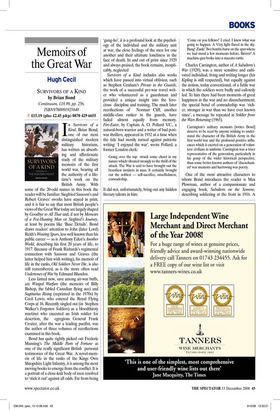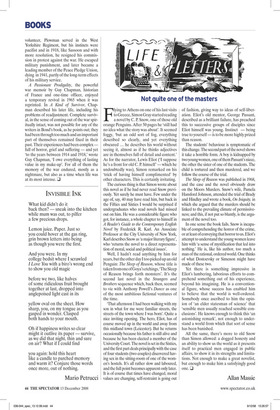Memoirs of the Great War
Hugh Cecil
SURVIVORS OF A KIND by Brian Bond Continuum, £18.99, pp. 256, ISBN9780091925840 ✆ £15.19 (plus £2.45 p&p) 0870 429 6655 In Survivors of a Kind, Brian Bond, one of our most distinguished modern military historians, has written an absorbing and affectionate study of the military memoirs of the first world war, bearing all the authority of a lifetime’s work on the
N
British Army. With some of the 20-odd names in this book the reader will be familiar: Siegfried Sassoon’s and Robert Graves’ sworks have stayed in print, and it is fair to say that most British people’s views of the Great War today are largely shaped by Goodbye to All That and, if not by Memoirs of a Fox-Hunting Man or Siegfried’s Journey, at least by poems like ‘Base Details’. Bond draws readers’ attention to John (later Lord) Reith’s Wearing Spurs, less well known than his public career — as is Anthony Eden’s Another World, describing his first 20 years of life, to 1917. Because of Frank Richards’s regimental connection with Sassoon and Graves (the latter helped him with writing), his memoir of life in the ranks, Old Soldiers Never Die, is also still remembered, as is the more often read Undertones of War by Edmund Blunden.
Less famed now, save among air-war buffs, are Winged Warfare (the memoirs of Billy Bishop, the fabled Canadian flying ace) and Sagittarius Rising (reprinted in the 1970s) by Cecil Lewis, who entered the Royal Flying Corps at 16. Recently singled out (in Stephen Walker’s Forgotten Soldiers) as a bloodthirsty martinet who executed an Irish soldier for desertion, the egregious General Frank Crozier, after the war a leading pacifist, was the author of three volumes of recollections examined in this book.
Bond has quite rightly picked out Frederic Manning’s The Middle Parts of Fortune as one of the really significant British personal testimonies of the Great War. A novel-memoir of life in the ranks of the Kings Own Shropshire Light Infantry, it is among the most moving books to emerge from the conflict. It is a portrait of a close-knit body of men resolved to ‘stick it out’ against all odds. Far from being ‘gung-ho’, it is a profound look at the psychology of the individual and the military unit at war, the close feelings of the men for one another and their ultimate loneliness in the face of death. In and out of print since 1929 and always praised, the book remains, inexplicably, neglected Survivors of a Kind includes also works which have passed into virtual oblivion, such as Stephen Graham’s Private in the Guards, the work of a successful pre-war travel writer who volunteered as a guardsman and provided a unique insight into the ferocious discipline and training. The much later recollections of Norman Cliff, another middle-class ranker in the guards, have faded almost equally from memory. Fire-Eater, by Captain A. O. Pollard V.C., a natural-born warrior and a writer of bad postwar thrillers, appeared in 1932 at a time when the tide had mostly turned against patriotic writing: ‘I enjoyed the war’, wrote Pollard, a former London clerk:
Going over the top struck some chord in my nature which vibrated strongly to the thrill of the attack. The War is said to have brought out the beastliest instincts in man. It certainly brought out the noblest — self-sacrifice, unselfishness, L 2008:SP 3// comradeship. ‘Come on you fellows!’ I cried. I knew what was going to happen. A Vèry light flared in the sky. Bang! Zunk! Two bombs burst on the spot where we had stood a few moments before. Brrrrrr! A machine-gun broke into a staccato rattle.
Charles Carrington, author of A Subaltern’s War (1929), was a more sensitive and cultivated individual, living and writing longer (his Kipling is still respected), but equally against the notion, today conventional, of a futile war in which the soldiers were badly and callously led. To him there had been moments of great happiness in the war and no disenchantment; the special bond of comradeship was ‘richer, stronger in war than we have ever known since’, a message he repeated in Soldier from the Wars Returning (1965).
Carrington’s military memoirs [writes Bond] deserve to be read by anyone wishing to understand the character of the British Army in the first world war and the profound positive influences which it exerted on a generation of volunteer civilians in uniform. Carrington was a truer representative of the generation, particularly in his grasp of the wider historical perspective, than some better-known authors of ‘disenchanted’ war memoirs and harrowing war poetry.
One of the most attractive characters to whom Bond introduces the reader is Max
: Page 4 : Page 4
Plowman, author of a compassionate and engaging book, Subaltern on the Somme, describing soldiering at the front in 1916. A volunteer, Plowman served in the West Yorkshire Regiment, but his instincts were pacifist and in 1918, like Sassoon and with more resolution, he resigned his commission in protest against the war. He escaped military punishment, and later became a leading member of the Peace Pledge Union, dying in 1941, partly of the long-term effects of his military service.
A Passionate Prodigality, the powerful war memoir by Guy Chapman, historian of France and one-time officer, enjoyed a temporary revival in 1965 when it was reprinted. In A Kind of Survivor, Chapman described his later life, including his problems of readjustment. Complete survival, in the sense of coming out of the war spiritually intact, was not possible for any of the writers in Bond’s book, as he points out; they had been through too much and an important part of themselves remained fixed in their past. Their experiences had been complex — full of horror, grief and suffering — and yet ‘to the years between 1914 and 1918,’ wrote Guy Chapman, ‘I owe everything of lasting value in my make-up’. For all of them the memory of the war endured, mostly as a nightmare, but also as a time when life was at its most intense. ❑











































































 Previous page
Previous page